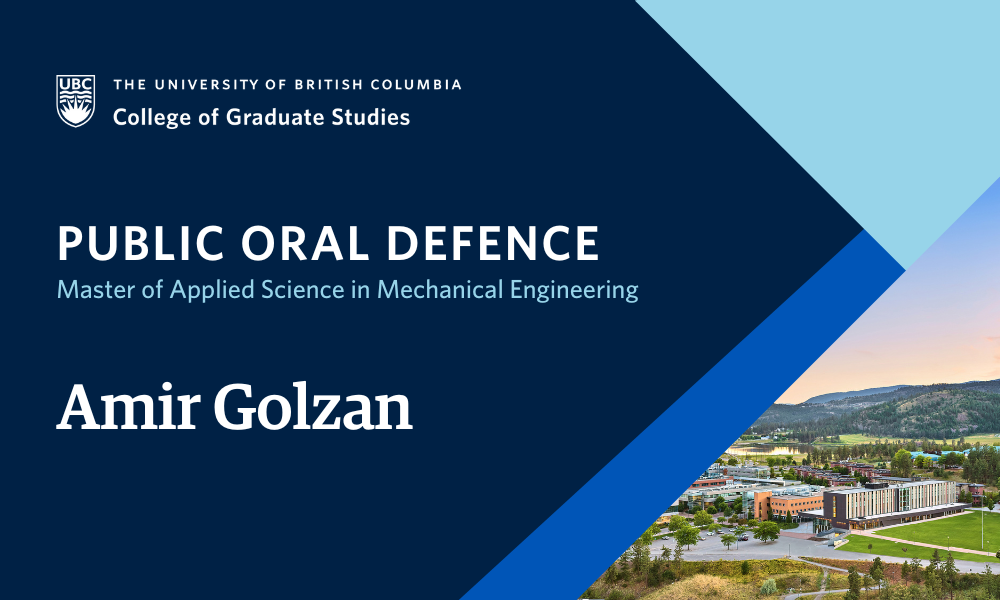
Thesis Defence: Exploring the Role of Cholesterol and Coprostanol in Clostridioides difficile Physiological Fitness: From Association with Fecal Microbiota Transplantation (FMT) Success to Causality Studies
December 4 at 10:00 am - 2:00 pm

Amir Golzan, supervised by Dr. Sepideh Pakpour, will defend their thesis titled “Exploring the Role of Cholesterol and Coprostanol in Clostridioides difficile Physiological Fitness: From Association with Fecal Microbiota Transplantation (FMT) Success to Causality Studies” in partial fulfillment of the requirements for the degree of Master of Applied Science in Mechanical Engineering.
An abstract for Amir Golzan’s thesis is included below.
Defences are open to all members of the campus community as well as the general public. Please email sepideh.pakpour@ubc.ca to receive the Zoom link for this defence.
ABSTRACT
Clostridioides difficile infection (CDI) is recognized as an urgent health-care threat due to its rising incidence, high mortality, and significant health-care-related costs. The gut microbiota and their metabolites are crucial for preventing C. difficile, and disruption of this microbial community can favour its colonization and infection. Fecal microbiota transplantation (FMT) has recently been incorporated into clinical practice for treating recurrent CDI, but its mechanisms of action still need further exploration. Cholesterol’s role in CDI extends beyond binding surface layer proteins and triggering inflammasome activation. It also follows a complex metabolic pathway in humans. When excess cholesterol reaches the intestine, colonic bacteria primarily convert it into coprostanol, a non-absorbable sterol excreted in feces, with efficiency varying between individuals. Interestingly, changes in the levels of these two luminal sterols, along with their intermediate metabolites—cholestenone and coprostanone—and their potential involvement in FMT success remain unexplored in CDI patients. Additionally, while cholesterol derivatives, especially bile acids, are well-studied in C. difficile pathogenicity, the direct effects of cholesterol and coprostanol remain largely unexplored. Lastly, despite the identification of intestinal cholesterol conversion over a century ago, only a few bacterial strains capable of converting cholesterol to coprostanol have been isolated and studied, with most either lost or difficult to cultivate. The overall objective of this study is to investigate the role of cholesterol and coprostanol in C. difficile’s physiological fitness and their link to FMT success.
The first experiments focused on assessing luminal sterol compounds in CDI patients and how FMT alters cholesterol conversion, shifting patients from initially being non-converters to high-converters. Building on these findings, causality tests assessed the effects of cholesterol and coprostanol on C. difficile germination, sporulation, and fitness, with coprostanol showing promising effects against C. difficile. Given the complexity of FMT mechanisms and the potential engraftment of cholesterol-converting bacteria in C. difficile patients, the second experiments (Chapter 4) built on Chapter 3 observations and our lab’s recent findings of high Akkermansia muciniphila abundance in healthy high-converters. These experiments showed A. muciniphila’s ability to reduce cholesterol, its increasing coprostanol production over time, and the subsequent inhibitory impact on C. difficile.
Overall, my study is the first to highlight the significance of luminal lipid profile changes in CDI patients. Understanding these changes can help uncover the mechanisms behind successful FMT. Additionally, my research clarifies the role of cholesterol and coprostanol in influencing key aspects of C. difficile’s lifecycle, potentially leading to new therapeutic strategies. Lastly, I demonstrated A. muciniphila’s capacity to produce coprostanol over extended exposure to cholesterol, significantly inhibiting C. difficile growth. This finding expands understanding of bacteria involved in cholesterol conversion to coprostanol and suggests A. muciniphila as a singular therapeutic agent against C. difficile, offering a potential alternative to FMT.